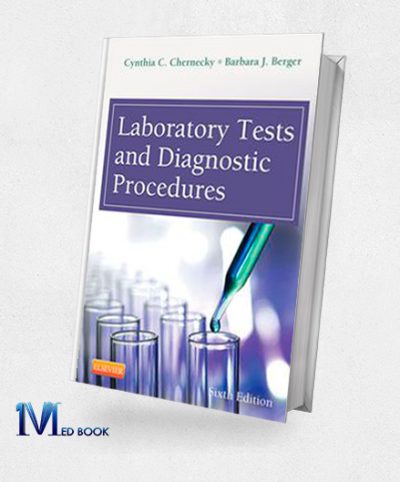Laboratory
Basic Skills In Interpreting Laboratory Data, 7th Edition (Original PDF From Publisher)
Original price was: $166.00.$35.00Current price is: $35.00.Laboratory Tests and Diagnostic Procedures 6th Edition (Original PDF from Publisher)
Original price was: $46.30.$22.60Current price is: $22.60.Laboratory
Introduction to Laboratory Science:
Laboratory science, a cornerstone of scientific exploration, plays a pivotal role in advancing knowledge, fostering innovation, and contributing to diverse fields. At the heart of this discipline lies the laboratory—a dynamic space where experiments unfold, hypotheses are tested, and discoveries are made. The significance of laboratory science spans a wide spectrum, encompassing scientific research, diagnostics, and applications that extend from basic exploration to clinical testing.
In scientific research, laboratories serve as incubators of ideas and catalysts for breakthroughs. They provide a controlled environment where scientists can meticulously investigate phenomena, unravel mysteries, and push the boundaries of knowledge. Whether delving into the complexities of molecular biology, exploring the mysteries of the cosmos, or studying the intricacies of the human body, laboratories are the crucibles where scientific inquiry takes tangible form.
Beyond research, laboratories are indispensable in the realm of diagnostics. In the clinical setting, they are hubs of precision, where healthcare professionals leverage cutting-edge technologies to analyze samples, detect diseases, and guide patient care. From blood tests that unveil physiological imbalances to genetic analyses that uncover predispositions, laboratories are integral to the diagnostic toolkit, shaping the landscape of modern healthcare.
The applications of laboratory science are as diverse as the disciplines it serves. Whether advancing our understanding of fundamental principles in chemistry, biology, or physics, or contributing to breakthroughs in medicine, environmental science, and technology, laboratories stand as dynamic hubs of exploration. As we delve into the multifaceted world of laboratory science, we uncover its far-reaching impact on shaping the present and paving the way for a future defined by innovation, discovery, and the pursuit of knowledge.
Types of Laboratories:
Laboratories come in various forms, each tailored to specific functions and purposes, contributing significantly to scientific knowledge and practical applications. Research laboratories are the epicenters of scientific exploration, where scientists conduct experiments to expand our understanding of fundamental principles in diverse fields such as chemistry, biology, physics, and more. These labs are characterized by their advanced equipment, controlled environments, and the pursuit of cutting-edge discoveries that push the boundaries of human knowledge.
Clinical laboratories, on the other hand, are dedicated to the practical application of scientific findings in the realm of healthcare. These labs focus on analyzing patient samples, employing diagnostic tools and technologies to detect diseases, monitor health parameters, and guide medical decisions. From blood tests to genetic analyses, clinical laboratories play a crucial role in providing accurate and timely information for patient care, contributing to advancements in medical diagnostics and personalized medicine.
Educational laboratories serve a unique purpose in fostering learning and skill development. Found in academic institutions, these labs provide students with hands-on experiences, allowing them to apply theoretical knowledge in a practical setting. Educational laboratories are essential for imparting scientific skills, nurturing curiosity, and preparing the next generation of scientists, healthcare professionals, and researchers.
In essence, the diverse types of laboratories collectively form the backbone of scientific inquiry and application. Research laboratories drive innovation and expand the frontiers of knowledge, clinical laboratories translate discoveries into practical healthcare solutions, and educational laboratories cultivate the skills and curiosity necessary for future advancements. Together, these laboratories contribute synergistically to the dynamic landscape of scientific exploration and application.
Laboratory Equipment and Instruments:
Laboratory equipment and instruments form the foundation of scientific experiments and analyses, enabling researchers to conduct precise measurements and collect valuable data across various disciplines. Basic glassware serves as essential tools in laboratories, including beakers, flasks, test tubes, and pipettes, allowing for the containment, mixing, and transfer of liquids. Graduated cylinders and burettes are employed for accurate volume measurements.
Analytical balances are crucial for obtaining precise mass measurements, while centrifuges use rapid spinning to separate components in a sample based on their density. Microscopes play a pivotal role in life sciences, allowing researchers to observe and analyze microscopic structures, cells, and organisms. Spectrophotometers and chromatography equipment facilitate the quantitative analysis of substances, measuring absorbance and separating components based on their chemical properties.
Laboratories often utilize various technologies for advanced analyses. Polymerase Chain Reaction (PCR) machines are instrumental in DNA amplification, and real-time PCR machines enable the monitoring of the process in real-time. Mass spectrometers identify and quantify molecules in a sample by measuring their mass-to-charge ratios, providing insights into the composition of complex mixtures. Nuclear Magnetic Resonance (NMR) spectroscopy aids in elucidating molecular structures.
In recent years, advancements in technology have given rise to sophisticated instruments such as next-generation sequencers, which revolutionize DNA sequencing, and high-performance liquid chromatography (HPLC) systems, enhancing the precision and speed of chemical analyses.
To summarize, the range of laboratory equipment and instruments available spans from essential glassware to advanced technologies, giving scientists the power to conduct experiments, obtain precise measurements, and gain valuable insights across various scientific disciplines. These tools are crucial for research, making it possible to explore the complexities of the natural world and expand scientific understanding.
Safety Protocols and Procedures in the Laboratory:
Laboratory safety is paramount to ensure a secure working environment and the well-being of researchers. Adhering to stringent safety protocols and procedures is crucial in preventing accidents, minimizing risks, and maintaining a culture of safety within the laboratory.
Safety guidelines are established to provide clear instructions on handling chemicals, operating equipment, and responding to emergencies. Researchers must be well-versed in these guidelines, which cover aspects such as proper storage and labeling of chemicals, safe disposal of waste, and the correct use of laboratory equipment. Regular training sessions on safety protocols are essential to keep researchers informed and updated.
Proper handling of chemicals is a fundamental aspect of laboratory safety. This includes understanding the properties of chemicals, following recommended storage conditions, and employing appropriate techniques during experiments. Researchers should be aware of potential hazards associated with each chemical and take necessary precautions to prevent exposure or accidents.
The use of personal protective equipment (PPE) is a critical component of laboratory safety. PPE includes items such as gloves, safety goggles, lab coats, and, in some cases, face shields or respiratory protection. Wearing the appropriate PPE provides a physical barrier between researchers and potential hazards, reducing the risk of injury or exposure.
Emergency response procedures must be well-defined and communicated to all laboratory personnel. This includes protocols for spills, fires, and other accidents. Emergency equipment such as eyewash stations, safety showers, and fire extinguishers should be easily accessible, regularly inspected, and maintained.
Regular risk assessments and safety audits help identify potential hazards and areas for improvement in laboratory safety. Researchers should actively participate in safety discussions and report any safety concerns promptly. A strong safety culture fosters collective responsibility for maintaining a secure working environment.
In laboratories, strict adherence to safety protocols, proper chemical handling, and use of personal protective equipment are crucial for safety.
Role of Laboratories in Scientific Research:
Laboratories play a pivotal role in scientific research, serving as dynamic hubs where experimentation, data collection, and the development of scientific theories converge to contribute significantly to advancements in various fields. These controlled environments provide scientists with the necessary tools and infrastructure to conduct systematic investigations and explore the intricacies of natural phenomena.
Experimentation lies at the core of laboratory activities. Scientists design controlled experiments to test hypotheses, manipulate variables, and observe outcomes. The laboratory setting allows for precise control over experimental conditions, ensuring that results are reliable, reproducible, and subject to rigorous scrutiny. Through iterative experiments, researchers can refine their approaches, explore new ideas, and contribute to the growing body of scientific knowledge.
Data collection within laboratories involves the systematic gathering of empirical evidence through various methods, such as measurements, observations, and analyses. Advanced instruments and technologies enable researchers to collect precise and quantitative data, fostering a deeper understanding of the phenomena under investigation. The availability of robust data sets facilitates statistical analysis, hypothesis testing, and the formulation of evidence-based conclusions.
Scientific theories, often developed and refined within laboratory settings, are the overarching frameworks that explain natural phenomena. Laboratories provide the empirical foundation for these theories, offering evidence that supports or challenges existing conceptual frameworks. As new data emerges from experiments, scientists can revise and expand theories, driving the evolution of scientific understanding.
Laboratories contribute to advancements across diverse fields, including physics, chemistry, biology, medicine, and engineering. In physics, laboratories explore fundamental principles governing the universe, while in chemistry, researchers investigate molecular structures and chemical reactions. Biological laboratories delve into the complexities of living organisms, and medical laboratories play a critical role in diagnostics, drug development, and understanding diseases.
The collaborative nature of laboratories, often involving teams of scientists with diverse expertise, fosters interdisciplinary research. This interdisciplinary approach leads to breakthroughs that transcend traditional boundaries and address complex scientific questions. Laboratories serve as environments where experts from different fields converge, share ideas, and collectively tackle multifaceted challenges.
Laboratories play a crucial role in the scientific research process by providing the necessary infrastructure for conducting experiments, collecting data, and developing theories. Their importance goes beyond individual experiments as they contribute to the collective knowledge of humanity and drive advancements in various scientific fields.
Clinical Laboratories and Diagnostics:
Clinical laboratories play a pivotal role in medical diagnostics, serving as essential hubs where samples are meticulously analyzed, tests are conducted, and critical information is generated to guide healthcare professionals in disease diagnosis and patient care. These laboratories are integral to the diagnostic process, providing accurate and timely results that inform clinical decision-making and treatment strategies.
One of the primary functions of clinical laboratories is to analyze diverse biological samples, ranging from blood and urine to tissues and fluids. Through advanced techniques and instrumentation, these laboratories scrutinize the composition of samples at a microscopic and molecular level. This in-depth analysis allows for the detection of specific biomarkers, abnormalities, and indicators associated with various diseases.
Conducting a wide array of tests is a cornerstone of clinical laboratories. These tests encompass diagnostic screenings, monitoring of chronic conditions, and the identification of infectious agents. Common tests include blood chemistry analyses, complete blood counts, microbiological cultures, and molecular diagnostic assays. The results obtained from these tests aid in confirming or ruling out specific medical conditions, facilitating precise diagnoses.
Healthcare professionals heavily rely on the information provided by clinical laboratories for disease diagnosis. Accurate and reliable laboratory results contribute significantly to the understanding of a patient’s health status. In conditions such as diabetes, cardiovascular diseases, and infectious illnesses, laboratory tests offer quantitative data that guide treatment decisions, assess disease progression, and evaluate the effectiveness of interventions.
In the realm of patient care, clinical laboratories play a vital role in personalized medicine. Genetic and molecular testing, for instance, allows for the identification of specific genetic markers and the customization of treatment plans based on an individual’s unique characteristics. This targeted approach enhances the efficacy of therapeutic interventions while minimizing potential side effects.
Clinical laboratories operate within the framework of stringent quality control measures and adhere to regulatory standards. This commitment to accuracy and precision ensures the reliability of laboratory results, fostering trust in the medical community and among patients. Timely and precise diagnostic information from clinical laboratories enables healthcare professionals to make informed decisions, initiate appropriate treatments, and monitor patient progress.
Clinical laboratories are crucial parts of the healthcare system that provide vital assistance for medical diagnosis. They offer valuable insights into patient health through the analysis of collected samples and the execution of various tests. The information they provide is essential for healthcare professionals to make accurate diagnoses, develop effective treatment plans, and ultimately improve patient outcomes. In conclusion, clinical laboratories play a vital role in enhancing the overall quality of healthcare.
Educational Laboratories and Skill Development:
Educational laboratories play a pivotal role in skill development by providing students with hands-on experiences that enhance learning across various disciplines. These laboratories serve as dynamic environments where theoretical knowledge is translated into practical applications, fostering a deeper understanding of concepts and cultivating essential skills.
One of the primary functions of educational laboratories is to bridge the gap between theory and practice. In disciplines such as science, engineering, and medicine, students gain valuable insights and skills by actively engaging with experiments and projects. These hands-on experiences allow them to explore concepts beyond textbooks, reinforcing theoretical understanding with real-world applications.
Laboratory experiences contribute significantly to skill development in scientific disciplines. Students learn to design experiments, collect data, and analyze results, honing critical thinking and problem-solving skills. Moreover, they gain proficiency in using laboratory equipment and techniques, developing technical expertise that is essential for future careers in research or industry.
In engineering and technology-related fields, educational laboratories provide a space for students to apply theoretical principles in practical scenarios. Through projects and experiments, students can test engineering theories, troubleshoot challenges, and refine their designs. This experiential learning approach nurtures creativity, innovation, and adaptability—the cornerstones of success in engineering disciplines.
In disciplines like computer science and information technology, educational laboratories offer environments for coding, programming, and system development. Students can apply coding languages and algorithms to solve real-world problems, reinforcing their programming skills and cultivating a deeper understanding of software and hardware interactions.
Beyond STEM (science, technology, engineering, and mathematics) disciplines, educational laboratories exist in fields like arts, language, and social sciences. In language laboratories, for instance, students practice language skills through interactive exercises, conversations, and multimedia resources. This immersive learning approach enhances language proficiency and cultural understanding.
Educational laboratories also foster teamwork and collaboration. Group projects and experiments encourage students to work together, share ideas, and solve problems collectively. These collaborative experiences mirror professional settings, preparing students for the interpersonal dynamics they will encounter in their future careers.
Furthermore, educational laboratories contribute to the development of practical skills such as time management, attention to detail, and effective communication. These skills are transferable across disciplines and are essential for success in both academic and professional contexts.
In conclusion, educational laboratories play a vital role in skill development across various disciplines. They provide hands-on experiences to students, thus enhancing learning, building critical skills, and preparing individuals for success in their academic and professional pursuits.
Innovations in Laboratory Science:
In recent years, laboratory science has undergone transformative innovations through technological advancements, automation, and digitalization, revolutionizing laboratory processes and significantly enhancing efficiency and accuracy in scientific endeavors.
Technological Advancements: The integration of cutting-edge technologies has reshaped laboratory science. Advanced instrumentation and equipment, such as high-throughput sequencers, mass spectrometers, and next-generation imaging devices, enable researchers to conduct experiments with unprecedented precision and speed. These technologies not only accelerate data acquisition but also enhance the depth and quality of scientific insights.
Automation: Laboratory automation has emerged as a key innovation, streamlining routine tasks and repetitive processes. Automated liquid handling systems, robotic platforms, and sample preparation systems have reduced manual labor, minimized errors, and increased the reproducibility of experiments. This not only boosts efficiency but also allows scientists to focus on more complex aspects of their research.
Digitalization: The digital revolution has played a pivotal role in reshaping laboratory workflows. Digital laboratory notebooks, electronic data capture systems, and cloud-based platforms have replaced traditional paper-based methods. This transition not only ensures efficient data management but also facilitates collaboration, allowing researchers to access and share data seamlessly. Furthermore, digitalization enables real-time monitoring and analysis of experiments, providing researchers with immediate insights.
Data Integration and Analysis: Innovations in data analytics have transformed the way scientists process and interpret experimental results. Advanced algorithms and machine learning techniques can handle vast datasets, uncover patterns, and derive meaningful conclusions. This data-driven approach not only expedites the analysis process but also opens avenues for discovering complex relationships within biological, chemical, or physical systems.
High-Throughput Screening: High-throughput technologies have revolutionized drug discovery and genomics research. Automated screening platforms allow researchers to test thousands of compounds or genetic sequences in a short timeframe, accelerating the identification of potential drug candidates or understanding complex biological processes.
Remote Access and Telelaboratory: The integration of remote access technologies and telelaboratory solutions has enabled scientists to control experiments and access laboratory equipment from anywhere in the world. This has proven especially valuable in situations where physical presence is challenging, providing researchers with flexibility and accessibility.
Integration of the Internet of Things (IoT): The Internet of Things has found applications in laboratory science, connecting instruments and devices for seamless communication. IoT-enabled sensors, for instance, can monitor environmental conditions, equipment status, and sample storage, ensuring optimal conditions for experiments and preserving the integrity of samples.
Technological advancements, automation, and digitalization have driven innovation in laboratory science, leading to significant improvements in efficiency and accuracy in scientific research. These transformative changes expedite research processes and contribute to generating high-quality, reproducible data, which fosters advancements across various scientific disciplines. In summary, laboratory science has undergone significant improvements due to cutting-edge technology, automation, and digitalization, leading to better outcomes across multiple scientific fields.
Challenges in Laboratory Work:
Laboratory work, while crucial for scientific advancements, is not without its challenges. Several key issues, including equipment maintenance, data reproducibility, and the necessity for rigorous quality control measures, pose significant challenges that must be addressed to maintain the integrity of research.
Equipment Maintenance: One of the prominent challenges in laboratory work is the maintenance of sophisticated and often delicate equipment. Regular upkeep and calibration are essential to ensure the accuracy and reliability of experimental results. Equipment failures or inaccuracies due to inadequate maintenance can lead to skewed data, compromising the validity of research outcomes.
Data Reproducibility: Achieving reproducibility of experimental results is a persistent challenge in laboratory science. Researchers must meticulously document protocols, experimental conditions, and procedures to facilitate the replication of experiments. Factors such as variations in reagents, environmental conditions, or subtle differences in methodology can impact the reproducibility of data, hindering the reliability of scientific findings.
Quality Control Measures: Maintaining high-quality standards in laboratory work is paramount for trustworthy research outcomes. Implementing rigorous quality control measures involves validating experimental procedures, monitoring instrument performance, and ensuring the consistency of reagents. Lack of stringent quality control can introduce variability and compromise the reliability of data, potentially leading to erroneous conclusions.
Contamination and Cross-Contamination: Laboratories are susceptible to contamination, whether from environmental factors, improper handling, or cross-contamination between samples. Contaminants can introduce unwanted variables, affecting experimental outcomes. Stringent sterile techniques, proper lab hygiene, and regular monitoring are essential to mitigate the risk of contamination.
Personnel Training and Skill Variability: The proficiency of laboratory personnel significantly influences the reliability of results. Skill variability among researchers, especially in multi-user laboratories, can introduce inconsistencies in experimental techniques and data interpretation. Continuous training programs and standardized protocols help minimize skill-related variations.
Resource Constraints: Laboratories often face constraints in terms of funding, space, and access to state-of-the-art equipment. Limited resources can impede the implementation of advanced technologies, affecting the efficiency and scope of research. Adequate financial support and strategic resource management are essential to overcome these challenges.
Ethical Considerations: Ensuring ethical practices in laboratory work is critical. Issues such as data manipulation, selective reporting, or inadequate disclosure of conflicts of interest can undermine the credibility of research. Upholding ethical standards requires a commitment to transparency, honesty, and adherence to established codes of conduct.
Addressing these challenges demands a comprehensive and proactive approach. Implementing robust quality assurance protocols, fostering a culture of transparency and accountability, investing in ongoing training for personnel, and allocating resources effectively are essential steps. By acknowledging and actively mitigating these challenges, laboratories can enhance the reliability and impact of their scientific contributions.
Conclusion
In conclusion, laboratory science stands as a cornerstone of scientific progress, contributing multifaceted insights that shape our understanding of the world. Its significance extends across diverse domains, including research, diagnostics, and education. The continuous evolution of laboratory practices reflects an unwavering commitment to innovation and excellence, enabling breakthroughs in knowledge and technology.
Laboratories play a pivotal role in advancing scientific endeavors by providing controlled environments for experimentation, data collection, and the development of new theories. The meticulous nature of laboratory work fosters the precision and reliability essential for scientific progress. From basic research that unravels the mysteries of life to clinical laboratories that aid in disease diagnosis and treatment, the impact of laboratory science reverberates across disciplines.
The evolution of laboratory practices is characterized by technological advancements, automation, and digitalization. These transformative changes have significantly enhanced the efficiency and accuracy of scientific processes. Innovations in laboratory science continually push the boundaries of what is achievable, paving the way for groundbreaking discoveries and the development of cutting-edge technologies.
Laboratories also play a crucial role in diagnostics, where accurate and timely information is essential for informed decision-making in healthcare. The meticulous analysis of samples in clinical laboratories contributes to disease diagnosis, treatment monitoring, and personalized medicine.
Moreover, educational laboratories serve as crucibles for skill development, allowing students to bridge theoretical knowledge with practical applications. Hands-on experiences in laboratories not only deepen understanding but also cultivate critical thinking and problem-solving skills that are invaluable in scientific pursuits.
As laboratory science continues to evolve, its impact on research, diagnostics, and education remains profound. Laboratories serve as hubs of innovation, where curiosity-driven exploration converges with technological advancements to unlock new frontiers. The commitment to excellence, adherence to ethical standards, and the pursuit of knowledge define laboratory science as an indispensable force in shaping the future of scientific discovery and understanding.



